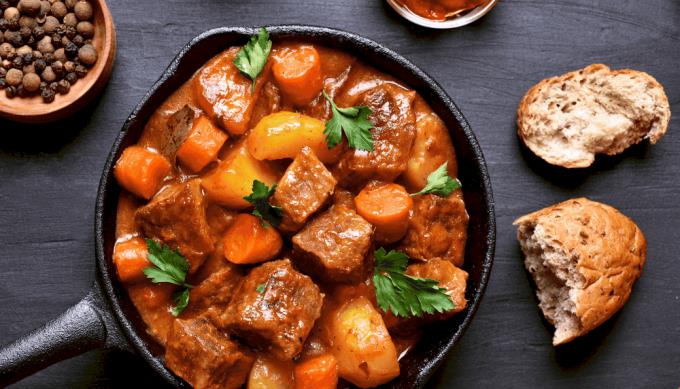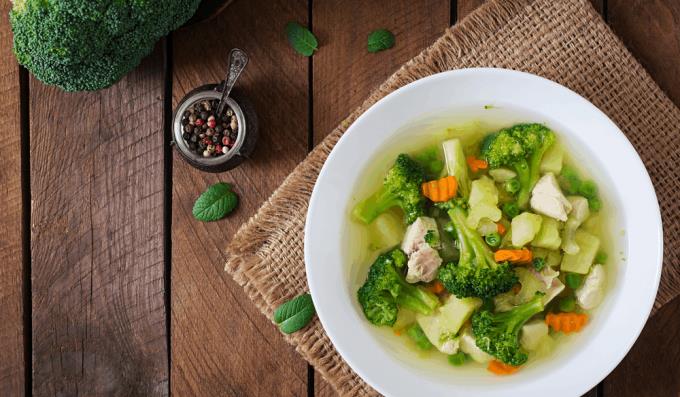Dietary food for pregnant women will help you limit and fight anemia during pregnancy, a dangerous condition affecting both mother and baby.
If you are learning about healthy foods for pregnant women to prevent and improve anemia during pregnancy , please refer to the article below of aFamilyToday Health.
Why is iron important to pregnant women?
Pregnancy increases your blood requirements by up to 50%. Iron is used by the body to make red blood cells. An increase in blood supply means you will need more red blood cells and more iron to make those blood cells. When you don't have enough iron in your body, you can become anemic.
Anemia is the most common blood condition in a pregnant woman during a developing fetus, putting both mother and baby at high risk of several complications, such as low birth weight and premature birth.
Types of iron
Iron is often found in many animal meat and fruits and vegetables with a rich content. There are 2 types of iron:
Heme iron: This type of iron is easily absorbed by the body, and you can find heme iron in meat, fish and other animal protein sources.
Non-heme iron : Non-heme iron is present in whole grains, beans, vegetables, fruits, and seeds. This iron is not easy to absorb and takes more time to metabolize.
Food for pregnant women contains heme iron

Foods high in natural iron can be very helpful in preventing and alleviating anemia symptoms. The benefit of iron supplementation from foods is its ability to be absorbed more efficiently than pills and other supplements. Iron from food also does not cause a weak intestinal condition that some drugs do.
Nutritionists recommend pregnant women get 27 milligrams of iron a day. Some iron-rich foods that are appreciated and good for pregnant mothers include:
1. Lean beef
Red meat is the best source of heme iron. A single 85g serving of lean tenderloin contains about 1.5 milligrams of iron. On the other hand, the way to cook meat is equally important because if you eat raw or undercooked foods, you run the risk of poisoning during pregnancy because the bacteria in the meat have not been completely destroyed.
When using the beef steak at a restaurant, ask for the beef to be cooked at a level that is safe for your health.
2. Chicken
Chicken contains a rich amount of iron and is also on the list of healthy foods for pregnant women. In addition, experts also appreciate the amount of protein and other vitamins and nutrients that chicken brings to pregnant mothers. In addition, this familiar meat is also easily processed into many delicious dishes, stimulating the taste but good for health such as mushroom stewed chicken, chicken soup ...
The only risk associated with chickens is infection with Listeria . This happens when the chicken is undercooked or the quality of the meat does not guarantee safe hygiene. Pregnant women infected with Listeria infection increase the risk of premature birth , miscarriage, infection in the newborn, or even premature death. Therefore, to eliminate the above cases, make sure the meat is thoroughly processed, avoiding raw or undercooked meat.
3. Salmon
Salmon is relatively high in iron and safe for pregnant women as long as the meat is fully cooked. In addition to iron, salmon also contains omega-3 fatty acids and other nutrients good for pregnant mothers. Salmon is also lower in mercury than some other fish, such as tuna and swordfish.
You should add salmon to the menu about 3 times / week to increase the iron and protein. In addition, some types of seafood that are considered safe for pregnant women include:
Clam
Hao
Shrimp
Catfish
Salmon
Pilchard
Herring.
Food for pregnant women contains non-heme iron

If you are following a vegetarian diet or meat-based foods that make your stomach bustle, pregnant women can still absorb plant-based iron, such as:
1. Beans
Legumes such as lentils, black beans, green beans ... contain a lot of protein and are extremely rich in iron. Besides, beans are also blood food for pregnant women with a plentiful source of fiber, helping you to improve constipation during pregnancy . In addition to using beans for stews, you can also use them to cook milk or tea to cool off during hot weather.
2. Spinach and kale
Spinach and kale are rich in antioxidants, vitamins and iron. These green vegetables are also very easy to combine with other dishes. You mix vegetables to make salad, serve with omelet or just stir-fry with meat.
3. Broccoli
Broccoli is not only delicious, but the nutritional value of this vegetable is also very impressive: Each 30g of broccoli brings 1mg of iron and is accompanied by vitamin C, a vitamin that helps the body absorb iron better.
In addition, this vegetable is also rich in fiber, helping pregnant mothers reduce unpleasant conditions during pregnancy such as constipation and bloating.
How to increase iron absorption during pregnancy
Besides the blood foods for pregnant women, you can also add support for the body by the food supplement to help absorb more iron, such as foods rich in vitamin C . Vitamin C has the ability to assist the body in breaking down and absorbing iron from foods as well as present in the following foods:
Kiwi
Papaya
Strawberry
Tomato
Broccoli
Bell pepper
Citrus fruits.
Iron plays a very important role for pregnant women in the production of blood. However, the body can not produce iron on its own, you need food for pregnant women to supplement this substance. In addition, you can refer to the article's suggestions to create a suitable diet, supporting the development of the fetus.













